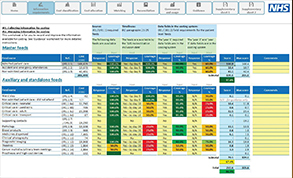Technical review – July 2019

A costing assessment tool (CAT) has been added to NHS Improvement’s online costing assurance programme resources. The tool provides an assessment of the quality of a trust’s costing and the degree to which costing standards have been implemented. It should help costing practitioners to record and measure progress against the standards. It will also help NHS England and NHS Improvement to identify and share good practice and to assess the status of costing in the sector, informing decisions on national initiatives to improve costing quality. The information provided in the CAT may also form the basis of providers’ assessment under the costing assurance programme. The tool should be completed and submitted to NHS England and NHS Improvement by 20 September.
NHS England and NHS Improvement has outlined the steps for clinical commissioning groups to validate their 2018/19 year-end position to meet the mental health investment standard (MHIS). Under the standard, each clinical commissioning group must ensure their mental health spending rises at a faster rate than their overall programme funding. CCGs must publish a statement setting out if they have met the standard or not, validated by auditors. Under the standard, eligible expenditure excludes learning disabilities and dementia and should be adjusted for non-recurrent spend. It includes spending on main mental health provider contracts as well as mental health-related spend in other contracts, including smaller mental health providers, non-mental health providers and non-NHS providers.
The NHS England and NHS Improvement pricing team is considering rolling over the price relativities used for the 2019/20 tariff into next year. The 2020 national tariff prices would still be subject to adjustments such as for inflation, efficiency and to meet the agreed cost base. But the relative difference between prices would not change unless there was a manual adjustment to address illogical relativities or other identified issues. The current tariff is based on the healthcare resource group HRG4+ currency design with the relativities informed by the 2016/17 reference costs. Feedback on the relativities and where corrections might be needed is due back, using an issued Excel spreadsheet, by the middle of July.
Trusts with non-clinical or clinical unregistered off-framework agency spend will be expected to eliminate this by September, NHS England and NHS Improvement has said. The bodies consulted on two proposals to restrict use of off-framework agency workers to fill non-clinical shifts and to restrict the use of admin and estates agency workers, with exemptions for special projects. While both proposals will go ahead, the national bodies have amended aspects, including creating a transition period to the new rules. As well as allowing three months for implementation, trusts will still be able to use break-glass arrangements for non-clinical workers if there are exceptional patient safety reasons. A similar transition has been set for admin workers, again with break-glass arrangements still applying. IT staff are also being exempted from the restriction.
Related content
The Institute’s annual costing conference provides the NHS with the latest developments and guidance in NHS costing.
The value masterclass shares examples of organisations and systems that have pursued a value-driven approach and the results they have achieved.